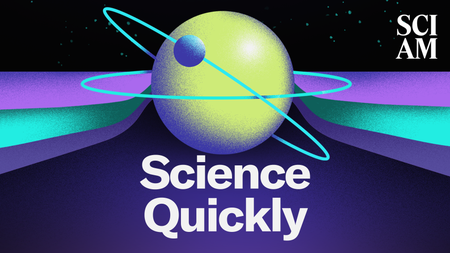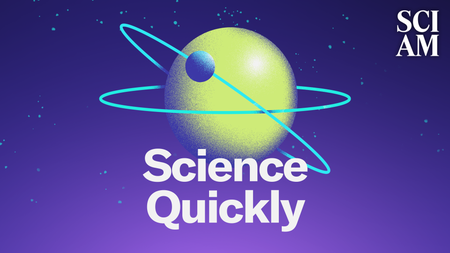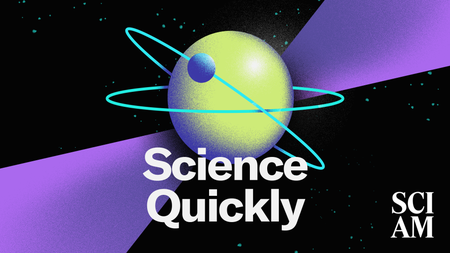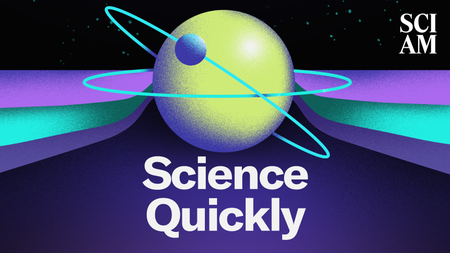
Watch Tornado Science at the Movies and the Perseids in the Sky
Windows devices go down, Twisters brings tornadoes to the big screen and COVID’s summer surge in this week’s news roundup.
Rachel Feltman is former executive editor of Popular Science and forever host of the podcast The Weirdest Thing I Learned This Week. She previously founded the blog Speaking of Science for the Washington Post.

Watch Tornado Science at the Movies and the Perseids in the Sky
Windows devices go down, Twisters brings tornadoes to the big screen and COVID’s summer surge in this week’s news roundup.

Cleaning Up Paris’s Poop River for the Olympics
The Seine will be the stage for the Paris 2024 Olympics’ Opening Ceremony—and for its marathon swimming events. But this urban waterway is challenging to keep clean.

Name a Quasi-Moon with Radiolab
Radiolab host Latif Nasser found and named a mysterious quasi-moon of Venus. Now you can help name one of Earth’s quasi-moons.

Astronauts Can Drink More Recycled Pee Than Ever, and You Can Still Catch the Plague
It’s been 55 years since the Apollo 11 mission, innovative “stillsuits” designed to recycle astronaut pee could enhance spacewalks, and a surprising case of the plague has occurred in Colorado.

Contemplating Our Climate Future in Antarctica
Researchers on a multimonth Antarctic expedition describe how the climate crisis intertwines with their work.

The Conservation Efforts That Brought Back the Last Truly Wild Horse
Claims that Przewalski’s horses were discovered in the U.S. are unverified. But the conservation story behind the last truly wild horse is worth your time.

Blast from the Past: In 1924 Scientific American Loved Coal (and Telepathy)
It’s well known that petrochemicals are toxic to our health. Here’s how to steer clear of these by-products of the fossil-fuel industry.

The Supreme Court Preserves Emergency Abortion Access, and NASA Plays It Safe With Starliner
Emergency access to abortion is preserved—for now. Also, NASA postpones the return of Starliner astronauts, and we’re tracking the spread of bird flu, dengue and mpox.

Life for Researchers on This Icebreaker Is Cold and Fulfilling
Get a behind-the-scenes look at how researchers live and work on a U.S. icebreaker making its way through the waters of West Antarctica.

How We Can Keep Ourselves and Our Communities Cool in the Summer Heat
Heat waves are getting hotter, more frequent and longer. But there are ways to keep yourself and your community cool.

Your Penis Might Be Full of Microplastics, and the Seine Is Definitely Full of Bacteria
Microplastics are everywhere, Olympic ambitions for the Seine River are complicated by poop, and the Starliner spacecraft delays its return to Earth.

Penguins and Ice Samples Make This Research Vessel Paradice
To unravel the effects of melting sea ice, researchers drill the frozen waters around Antarctica and receive a surprise visit from a group of penguins.

What Happens if a Nuclear Weapon Goes Off in Space?
A nuclear explosion in space would cause stunning auroras—and wreak havoc on satellites and space stations.

There’s No Need to Panic over ‘Flying’ Spiders, and Satellites Are Not So Great for the Ozone Layer
Sweltering heat in Greece, ozone-damaging chemicals on the decline and an investigation of what space does to our body are all in this week’s news roundup.

Glacial Melting Could Change the Chemistry of Antarctic Seawater
Researchers are investigating how an iron infusion from glacial meltwater might change Antarctica’s seas and the climate.

Your Tattoo Ink Might Contain Hidden Ingredients
Chemists are hard at work figuring out how to make tattoos last—and ensure they’re safe.

Rock Samples from Far-Side of the Moon and a ‘Morning-After Pill’ for STIs
The Hubble Space Telescope’s woes, moon rocks and antibiotic candidates discovered with AI are all in this week’s news roundup.

Do Plants ‘Think’? We Might Not Know Enough about Consciousness to Be Certain
Zoë Schlanger’s new book The Light Eaters explores the surprising science of plant intelligence.

Snacking on Cicadas Can Be Sustainable and Delicious
Make the best of the “double brood” of cicadas with insect kimchi and tempura-fried bugs.

Could ‘Pee-Cycling’ Help Clean Cape Cod’s Water?
A cost-effective pollution solution on Cape Cod could start in the bathroom.

You Can Protect Wildlife without Leaving Home
You don't have to venture far to make a difference for wildlife.

Cape Cod Weighs Big-Ticket Pollution Solutions
Toxic algal blooms are forcing Cape Cod communities to consider expensive sewer and septic system projects.

Cooperation Is the Key to Surviving the Apocalypse
Cooperation theorist Athena Aktipis talks about zombies, game theory, go bags and more in her new book, A Field Guide to the Apocalypse.

AI Is Getting Creepier, and Risky Cheese Is Getting Trendier
A rare geomagnetic storm lit up skies, eerie AI demonstrations and a cautionary word about raw milk.